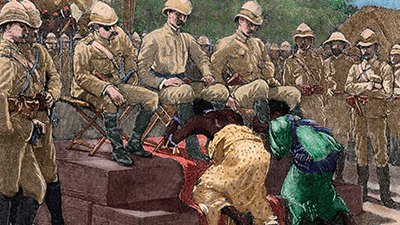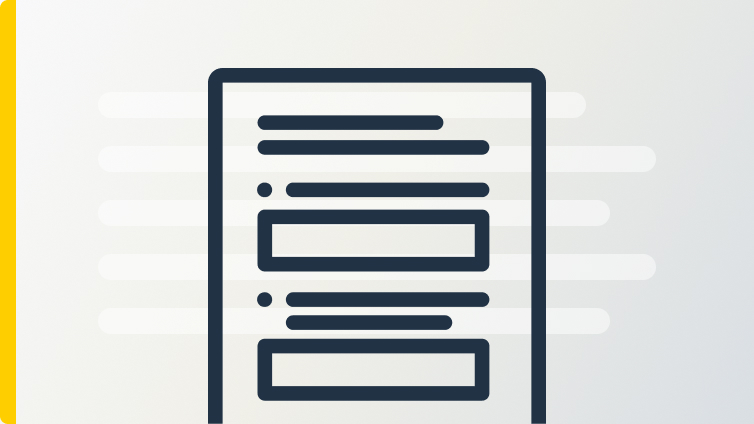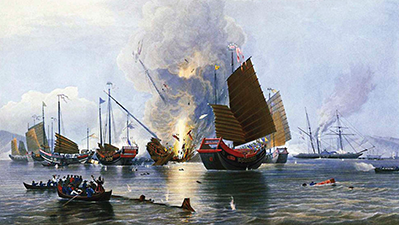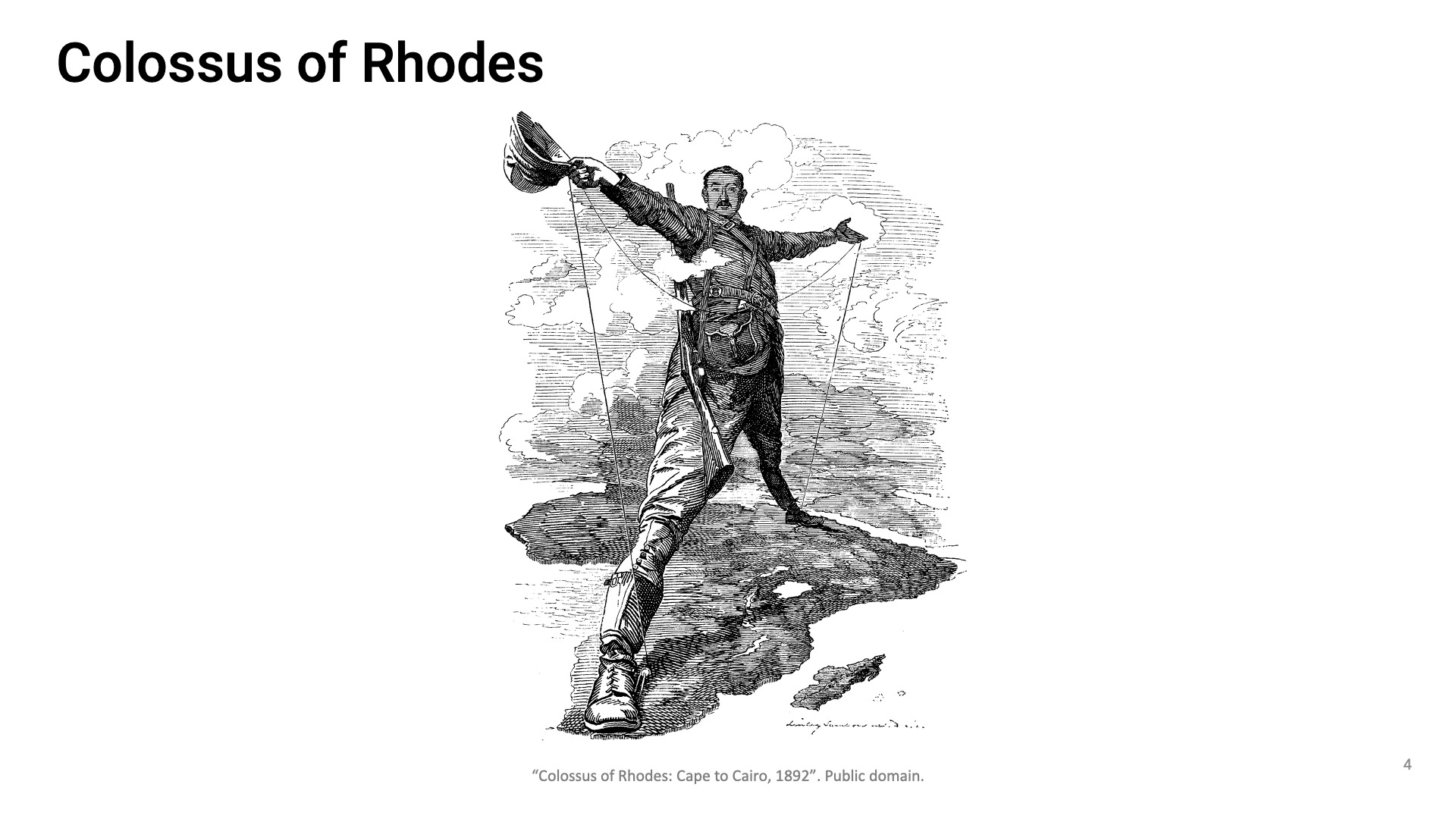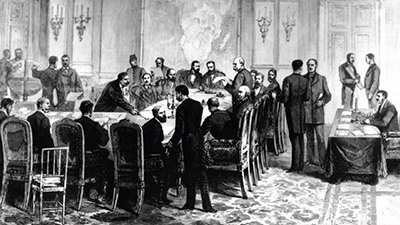Industrial Imperialism
Driving Question: How did industrialization change empires?
Empire wasn’t new, but after industrialization, it was different. Industry turned conquest into a system backed by weapons, ideas, and global ambition.
Learning Objectives:
- Use causal thinking to understand how industrialization enabled imperial powers to expand their empires.
- Use the historical thinking process of contextualization to analyze the conditions that led to the Opium Wars.
- Utilize image-analysis skills to consider different theories and perspectives about the age of “new” imperialism.
Vocab Terms:
- authority
- imperialism
- indirect rule
- paternalism
- racism
- resistance
- subject
Opener: Industrial Imperialism
To teach this lesson step, refer to page 3 of the Lesson 7.9 Teaching Guide.
Start connecting industrial advances to imperialism by looking at how new technologies and economic systems gave empires more reach, control, and ambition.
The New Imperialism
To teach this lesson step, refer to page 3 of the Lesson 7.9 Teaching Guide.
This activity is an important part of the Sourcing Practice Progression, however, if you’re short on time, try the Quick Sourcing Tool.
These materials introduce the “new” imperialism of the nineteenth century. You’ll examine how industrial power changed imperial strategies, and how people critiqued and resisted imperial rule.
-
Guiding Questions
-
Before you read
Preview the questions below, and then skim the article. Be sure to look at the section headings and any images.
While you read
Look for answers to these questions:
- In what ways were late nineteenth-century empires similar to earlier ones?
- What made these newer empires different from earlier ones?
- How did technology support the spread of imperialism?
- How did capitalism, industrialization, and racism create motives for empire?
- What role did nationalism and “men-on-the-spot” play in expanding empire?
After you read
Respond to these questions: Which reasons for the rise of new imperialism do you find most convincing? Which seem less important, and why?
The Opium Wars
To teach this lesson step, refer to page 7 of the Lesson 7.9 Teaching Guide.
Contextualization is a hard skill to master. Look at the Contextualization One-Pager for more about teaching this skill.
Analyze the Opium Wars by using the event cards to complete the Contextualization Tool.
-
Guiding Questions
-
Before you read
Preview the questions below, and then skim the article. Be sure to look at the section headings and any images.
While you read
Look for answers to these questions:
- What is economic imperialism, and why did some empires use it?
- Why was tea important in the relationship between Britain and China?
- What did Britain sell to China? How did the Chinese government respond?
- What caused the First Opium War?
- What were the “unequal treaties,” and what did they do?
After you read
Respond to this question: How might the history of the Opium Wars still influence global affairs today?
Images of Imperialism
To teach this lesson step, refer to page 11 of the Lesson 7.9 Teaching Guide.
Imperialism Cartoons can be a very fun class activity. Read more in this Imperialism Cartoons thread in the Community Forum.
Sometimes a picture says more than a paragraph. In this part of the lesson, you’ll analyze political cartoons to uncover how people viewed imperialism—both those who promoted it and those who resisted it.
Imperialism Cartoons
Closer: Industrial Imperialism
To teach this lesson step, refer to page 12 of the Lesson 7.9 Teaching Guide.
Have the bug to learn even more about imperialism? The Greater East Asia Co-Prosperity Sphere: Japan’s ironic imperialism is a a great place to start.
Wrap up the lesson by thinking critically about industrial imperialism and how it relates to other global changes you’ve explored.
Negotiating Empire
To teach this lesson step, refer to page 12 of the Lesson 7.9 Teaching Guide.
These materials link early global trade tensions to the peak of European imperialism. You'll examine Britain’s failed 1793 mission to China and the Berlin Conference, where industrial powers divided Africa. Together, these sources reveal how industrialization reshaped empires across the world.
-
Guiding Questions
-
Before you read
Preview the questions below, and then skim the article. Be sure to look at the section headings and any images.
While you read
Look for answers to these questions:
- Why was the Berlin Conference held? Who was included and who was left out?
- What event led to the start of the conference?
- What were three key outcomes of the conference?
- How did Menelik II respond to the conference decisions? What was the result?
After you read
Respond to this question: How did the Berlin Conference change life in both Africa and Europe through “legal violence”?
-
Guiding Questions
-
Before you watch
Preview the questions below, and then review the transcript.
While you watch
Look for answers to these questions:
- Why was Portsmouth important in 1793?
- What region led the global economy at the end of the eighteenth century?
- Why did Britain want to expand trade with China?
- What role did other European powers play in the Indian Ocean economy?
- Did Macartney succeed in his mission to China?
After you watch
Respond to these questions: Based on the video, which country—China or Britain—seemed more likely to dominate the global economy in the nineteenth century? Why?
Key Ideas
Opinions on Imperialism
To teach this lesson step, refer to page 14 of the Lesson 7.9 Teaching Guide.
Use these primary source excerpts to analyze different European perspectives on imperialism.



